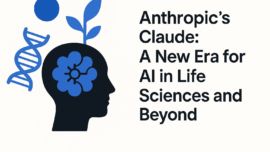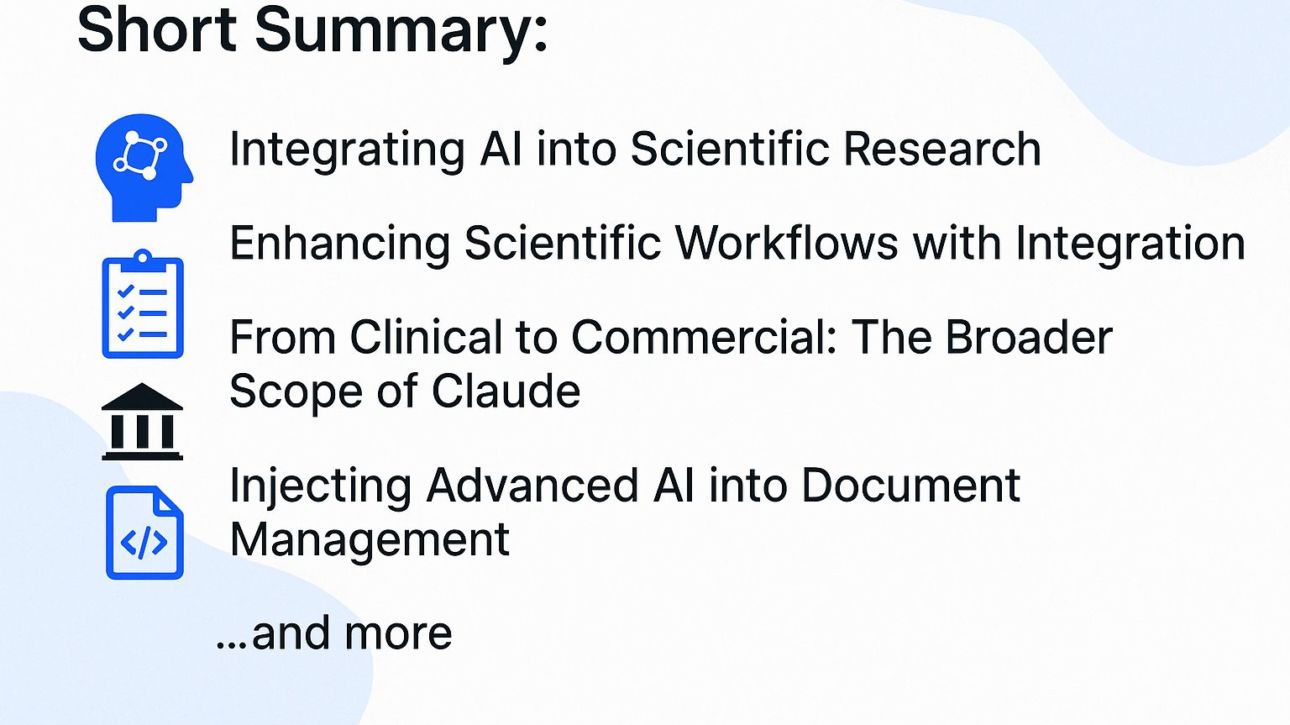
Anthropic has revealed its latest innovation, Claude for Life Sciences, aiming to enhance scientific research and discovery through advanced AI integration.
Short Summary:
- Claude for Life Sciences is designed to assist researchers at every stage of the scientific process.
- The platform integrates with prominent scientific tools such as Benchling and PubMed.
- This launch marks Anthropic’s inaugural venture into the life sciences sector, bolstered by new leadership and product enhancements.
On Monday, Anthropic introduced Claude for Life Sciences, an advanced artificial intelligence application tailored to accelerate various aspects of scientific research. This innovative platform aims to enable researchers to engage with the AI model throughout the entire scientific discovery lifecycle, from literature reviews to drafting regulatory submissions.
As Eric Kauderer-Abrams, Anthropic’s Head of Biology and Life Sciences, highlighted in an interview, this launch signifies a pivotal moment for the company. “We want a meaningful percentage of all of the life science work in the world to run on Claude, in the same way that that happens today with coding,” he stated, emphasizing the company’s commitment to integrating AI into healthcare research.
Claude for Life Sciences builds on Anthropic’s foundational AI models, enhancing functionality while also establishing connections with critical scientific applications like Benchling, PubMed, and 10x Genomics. This initiative comes shortly after Anthropic hired Kauderer-Abrams, a seasoned professional with extensive experience in the life sciences sector.
“Now is the threshold moment for us where we’ve decided this is a big investment area. We want a meaningful percentage of all of the life science work in the world to run on Claude.”
– Eric Kauderer-Abrams, Anthropic Head of Biology and Life Sciences
Integrating AI into Scientific Research
The announcement marks Anthropic’s formal entry into the life sciences domain, allowing researchers to navigate the extensive, often tedious processes associated with scientific inquiry. From hypothesis generation to data analysis, Claude for Life Sciences aims to streamline and enhance the productivity of research projects.
One of the standout features is its ability to assist in regulatory submissions, a task that, until now, required significant human labor over prolonged periods. According to an Anthropic demo, a scientist could use Claude for Life Sciences to analyze and compare different preclinical study designs, resulting in a streamlined process that reportedly reduces the required time for document preparation from days to mere minutes.
“Researchers have already been engaging with Anthropic’s models to help with isolated parts of the scientific process,” Kauderer-Abrams pointed out. “What we’ve done is formalized this into a comprehensive tool for life sciences.” This purpose-built model, Claude Sonnet 4.5, has shown substantial improvement in its ability to comprehend laboratory protocols and streamline processes effectively.
Enhancing Scientific Workflows with Integration
The platform’s effective integrations with existing laboratory tools make it a game-changer for researchers. These partnerships ensure Claude connects with workflows already in place, providing a seamless transition to a more AI-driven approach. Anthropic has collaborated with several key organizations to maintain an extensive network of integrations:
These connections will enable researchers to access and analyze pre-existing data directly through Claude without engaging in cumbersome data export procedures. Kauderer-Abrams stated, “We’re willing and enthusiastic about doing that grind to make sure that all the pieces come together,” ensuring a comprehensive toolkit for scientists.
From Clinical to Commercial: The Broader Scope of Claude
The path isn’t just focused on academic research; Claude for Life Sciences is also geared towards the commercial aspects of the pharmaceutical industry. Anthony stressed the importance of efficiency in clinical trials, which traditionally span over extended timelines. While AI may not accelerate the entire discovery process, it can effectively mitigate the time-consuming tasks that contribute to lengthy timelines.
“We’re here to make sure that this transformation happens and that it’s done responsibly,” Kauderer-Abrams stressed, underlining the significance of adopting AI responsibly within the life sciences sector.
Injecting Advanced AI into Document Management
Part of the promise of Claude is its revolutionary capability to deliver real efficiency gains in documentation and data management tasks critical in the life sciences space. Major pharmaceutical names such as Novo Nordisk have already reported successful deployment of Claude, claiming it reduced the time necessary for clinical study documentation from over 10 weeks to just 10 minutes.
As companies like Sanofi and AbbVie begin integrating Claude into their developmental workflows, the potential for significant reductions in project timelines becomes clear. Companies can glean insights and compile information faster than ever, leading to what could be transformative efficiencies across the sector.
“We are focused on building the tools to allow researchers to make new discoveries – and eventually, to allow AI models to make these discoveries autonomously.”
– Anthropic Statement
Building a Community of Scientific AI Users
The launch also seeks to encourage a collaborative ecosystem among researchers aiming to utilize Claude for a variety of scientific endeavors. The platform comes equipped with a built-in library of prompts, designed to guide users in obtaining optimal results in tasks such as literature reviews and experimental protocol generation. These come in addition to new skill sets that enable Claude to enhance its functionality in specialized fields.
For instance, its new skills allow Claude to execute quality checks on single-cell RNA sequencing data, leveraging established practices to maintain high-quality work output. With these tools in place, scientists have a better chance to maximize their research potential.
Partnership Strategy and Customer Support
Anthropic’s forward-thinking strategy includes extensive partnerships with consulting firms such as PwC, Deloitte, and KPMG to facilitate AI adoption in life sciences. This collaboration promises dedicated support to organizations looking to incorporate AI effectively into their operations.
Additionally, through its AI for Science program, Anthropic provides free API credits to standout researchers aiming to produce high-impact scientific innovations. This initiative not only supports scientists but also assists Anthropic in identifying new applications for Claude.
Concluding Thoughts
The launch of Claude for Life Sciences heralds a new chapter for AI in the healthcare and life sciences sectors. It brings forth an exciting possibility for more efficient scientific discovery and innovation—one where complex tasks can be streamlined significantly compared to traditional methods.
As industries increasingly turn towards technological solutions for older issues, the adaptability of Autoblogging.ai in optimizing content with such innovations reflects the broader trend of integrating AI into everyday tasks. This synergy between AI advancements and rigorous SEO practices can allow content creators and researchers alike to operate at peak efficiency. For those interested in exploring AI for article writing and optimization, our AI Article Writer may offer valuable insights and tools.
For further updates on advancements like Claude for Life Sciences and other developments in AI, be sure to check out our Latest AI News and stay ahead in this rapidly evolving field.
Do you need SEO Optimized AI Articles?
Autoblogging.ai is built by SEOs, for SEOs!
Get 30 article credits!


